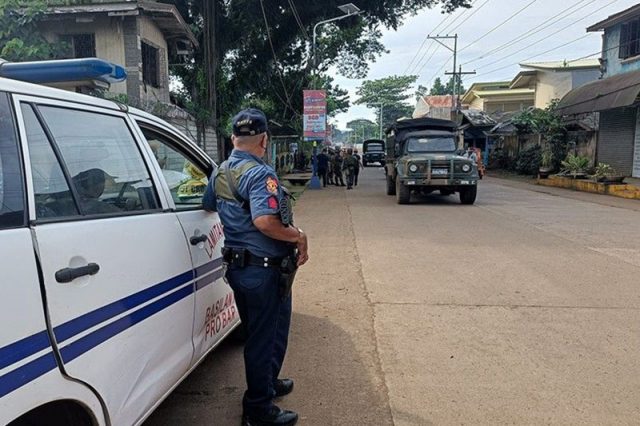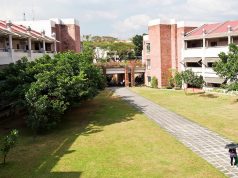
Following the death of the father of Ateneo gunman Chao Tiao Yumol, appeals for officials to step in were made online as the concept of “rido” gets talked about.
Reports said that Ronaldo Yumol was shot by two unidentified suspects onboard a motorcycle while he was outside his residence in Barangay Maganda, Lamitan City, Basilan on Friday morning.
The patriarch was a retired member of the Philippine Constabulary.
He obtained four gunshot wounds and was rushed to the Lamitan District Hospital where he was declared dead on arrival.
Police Brig. Gen. Roderick Alba, Philippine National Police public information officer, said they are already investigating the case.
“So far, it is speculative to assume its direct relation to the shooting incident that happened last Sunday at the Ateneo de Manila University,” he said.
Residents believe that it might be a vendetta over the killing of former Lamitan City mayor Rose Furigay, who was shot by Yumol’s son.
RELATED: ‘Such a loss’: How slain ex-Lamitan Mayor Rose Furigay is remembered
The patriarch was shot five days after Chao Tiao Yumol, his son, infiltrated the graduation of Ateneo de Manila University‘s law students and shot Rose, her aide Victor Capistrano and Ateneo security guard Jeneven Bandiala.
READ: ‘He deserves to be named and recognized’: Filipinos mourn death of Ateneo guard
Hannah, Rose’s graduating daughter, and a bystander were injured from the violence.
The younger Yumol was charged with three counts of murder and frustrated murder.
RELATED: Ateneo shooting: What we know about suspect Chao Tiao Yumol
Yumol and the Furigays
Chao was reported to have a personal grudge against Rose, who had implemented a cease-and-desist order against his infirmary clinic in 2018. It was found to operate without a license.
The order reportedly came from then-health minister physician Saffrullah Dipatuan of the Bangsamoro Autonomous Region in Muslim Mindanao (BARMM).
Physician Shalmalynne Ampatuan, deputy cluster head of the BARMM health ministry, had also ordered Chao to close his clinic or risk getting sued and shut down by the Lamitan City government.
Chao then became a critic of the Furigays following the incident.
He accused Rose and her husband, then-Lamitan City vice mayor and now incumbent Mayor Roderick, of alleged corruption and drug trade involvement. The couple denied the accusations.
Chao continued posting his allegations on social media, which led him to the filing of cyber libel cases against him. One of them resulted in his arrest in 2019.
Meanwhile, the Furigay family is considered a household name in Basilan’s local politics.
Since Lamitan became a city in 2007, it only had Rose and her husband as its mayors.
Roderick served three terms from 2004 to 2013, while Rose served three terms after him until May 2022.
Her husband won the 2022 local elections.
The Lamitan City consistently received the Department of the Interior and Local Government‘s Seal of Good Local Governance under Rose’s watch.
Rido?
The elder Yumol’s death received comments from the local online community, which suspected the incident as an effect of “rido.”
“This is a ‘rido’ or family feud. Eye for an eye to redeem the family’s honor. The trail of violence involving the protagonists is well-documented but no one did anything to prevent its escalation,” former tourism secretary Rafael Alunan III wrote.
“Obviously, the local Peace and Order Council Chairman is conflicted. The DILG and the Basilan governor, as Provincial POC chair, better step in before more blood is spilled,” he added.
“Rido exists… The cycle of violence continues until one clan completely eliminates the other,” another Facebook user partly said.
“RIDO can last generations if they want it to. This is sad but this is the reality. The Furigay Family is an extremely powerful family but the ball is in Yumol’s family now. Will we call out the Furigay family for this? Or does this align (with the) poetic justice ’cause Dr. Yumol shot the matriarch?” wrote a different Pinoy.
“Murder is murder. Plain and simple. I hope the government may have some sort of intervention because this is not a simple CASE CLOSED type of scenario. The local peace and order council, the DILG, the governor should step up. I hope justice will prevail for both families,” he added.
Anthropologist Wilfredo Magno Torres III describes “rido” as a type of conflict characterized by sporadic outbursts of retaliatory violence between families, kinship groups, and communities.
An article on The Diplomat says that rido “involves a vendetta killing provoked by an affront or disgrace to the honor of a family or its members,” adding that it is deeply rooted in the local culture of dominant ethnic groups in Mindanao.
The term “rido” derives from the Maranao tribe and is known as clan feuds.
Torres further said it is a “state of recurring hostilities between families and kinship groups characterized by a series of retaliatory acts of violence carried out to avenge a perceived afront or injustice.”
“Revenge killings and feuds are typical in small-scale societies where family and kinship ties are the main sources of authority and where there is a lack of effective state control and authority,” he said in his book “Rido: Clan Feuding and Conflict Management in Mindanao.”
“In such societies where the state is weak, decision-making and enforcement become more decentralized and the provision of security is based mainly on self-help,” Torres added.
“This means that in the absence of a strong state or central authority, the responsibility and the means for coercion are more widespread, such that governance and social control usually rests in the local population. Under such circumstances, the distribution of responsibility and capacity for the provision of security are more likely to be organized along the lines of kinship,” he wrote.
Torres said that triggers of “rido” can range from petty offenses like theft and jesting, to more serious crimes like homicide.
He added that, according to studies, land disputes and political rivalries are the most common causes of conflict.









